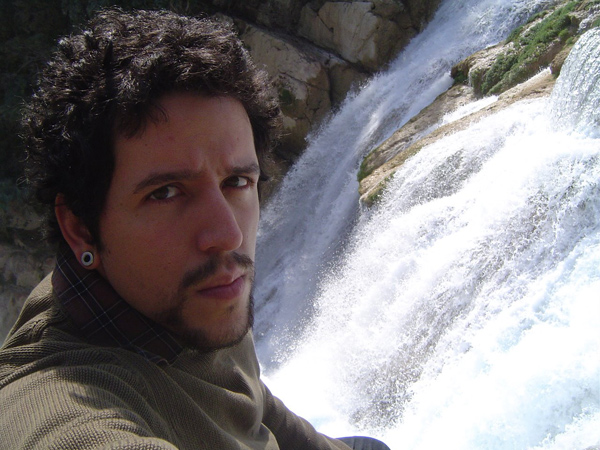
In 2004, Darrin Fowler started the BME Scholarship project, a community-funded program established to award one student from the BME community every year with a donor-based scholarship, based on the strength of an essay of the scholarship administrator and judges’ choosing. The winner of the 2005/06 scholarship was Diego Olavarría, whose winning essay can be read here. We recently caught up with Diego and exchanged e-mails over a couple of days, discussing where his education has taken him, where to find artistic inspiration, and his take on how society interacts with body modification nowadays. I’ll note that Diego’s last response is actually more like a short essay, but it’s fantastic. I hope we’ll be hearing from Diego again very soon.
To participate in or donate to this year’s scholarship fund, please visit BMEScholarship.com.
BME: First of all, tell us a bit about yourself.
Diego Olavarría: Well, I think I should start with the essentials. My name’s Diego, I’m 24, and I won the BME Scholarship back in 2006. I do many things with my life, but nowadays I think what I do most is study, read, translate, write, and travel … as well as buy groceries and all sorts of other mundane activities that take up more of my time than they should. Despite what most people who know me would have predicted a few years ago (because I openly and constantly admitted hating the place), I live in Mexico City, although I don’t see myself growing old here.
BME: What don’t you like about Mexico City?
DO: Well, that’s a question which I could spend the rest of the day answering, but in general, I think it’s fair to say it’s a rather unhealthy place to live in, a very stressful place. If you don’t take it with a (copious) dose of humor, it gets to you. It’s hard to find peace and quiet here; you’re just constantly attacked everywhere by ads, bad music, car horns. It can be dirty, it can be dangerous (although a lot less so than it’s usually made out to be, I think. You can live more sheltered from crime here than in other Latin-American cities). What else? There aren’t many trees, the drivers are aggressive, distances are big, public transportation sucks, so does the traffic, there are too many people everywhere. People live in fear of each other, the police can’t be trusted, the wealth-gap is huge …
But on the other hand, the weather is pretty good, and if your daily activities don’t require a lot of commuting and you live in an interesting area, it can be a pretty enjoyable place. There’s a good level of cultural activity, cheap eateries, well-stocked bookstores, the best university in Mexico, and it’s overall a pretty colorful and surreal city. Its a good place to see strange things happen. A place like this keeps you inspired.
BME: Do you think it’s sometimes more important to be inspired by your surroundings than to actually enjoy them?
DO: That’s a very good, but also a very difficult question. To answer it, I will have to reflect on what “enjoyment,” “inspiration” and “peace of mind” (peace is where I draw profound enjoyment from) all consist of. As someone who creates (as I mentioned earlier, I write), I think it is important to be inspired by my surroundings. Some people draw inspiration from past events, and really don’t care much about their settings; that is not my case. Settings are important. However, if forced to choose, I’m sure I would prefer peace of mind over inspiration. Mexico City is a good place to spend a few years, but it’s a killer place in the long run. What I mean is that I wouldn’t want to spend the rest of my life here.
It’s quite true that much of the art in the last hundred years has a tendency to create an aesthetic effect of the unpleasant. Most good books and paintings are disturbing pieces. Most of the best artists have been tormented souls, people consistently disturbed by metaphysical and historical terrors. Seen through this perspective, Mexico City could be a work of art, perhaps even a masterpiece.
But do I live here because I prefer enjoyment over inspiration? I think it’s important to find a middle ground between one and the other. For instance, I’m sure that war is very inspirational, and so are tragedies and diseases. But I wouldn’t voluntarily bring them into my life just because they inspire me. Like if the uninvited problems weren’t enough! Otherwise I would be a bit like a Dostoevsky or a Roberto Arlt character, someone who needs guilt and pain to move on, and who is willing to bring it upon themselves. And on the other hand, I appreciate peace more after a bit of torment. Mexico City is my platform into both worlds. It’s a place I’ve chosen consciously because, on one hand, it keeps my mind alive (it inspires me), and on the other, I’m lucky enough to have found a way to deal with it so that it doesn’t drain my soul away (meaning I can also be at peace here).
BME: How does the city compare to some of the other places in which you’ve lived (or at least in which you’ve spent significant periods of time)?
DO: Well, I guess Mexico City has problems that are common to all large cities, but they just seem bigger here because of the amount of people. It’s a terribly hard place to organize. There are lots of things that compare and contrast, but one thing that’s unique to Mexico City is the light. I don’t know another city that has the same kind of light. Maybe it’s because of the smog, maybe it’s the colors of the houses, or the glow of the pavement. I don’t know. The effect is sort of dirty, dusty, grayish and unappealing. But when the cold wind blows in in the evening, sometimes you have these incredible pink sunsets.
Some cities I’ve been in (Rio de Janeiro, Paris) are beautiful. Others (Lima, Sao Paulo) are ugly. Mexico City happens to be both, at the same time. It’s also a city that’s been through a lot. It was the capital of the Aztec empire (it was probably the biggest city in the world by then), and at some point during the colonial era it was the most important city in the Americas. It has been totally and effectively urbanized (the natural settings have been annihilated: there are no rivers, all lakes have been dried up, there are not many trees left), but at the same time it’s located next to a volcano that could erupt any second; it’s near a fault, and therefore an earthquake could shake the place down in a matter of minutes. I find the whole setting pretty intense, and I don’t know if there are many cities who have so much to say about themselves.
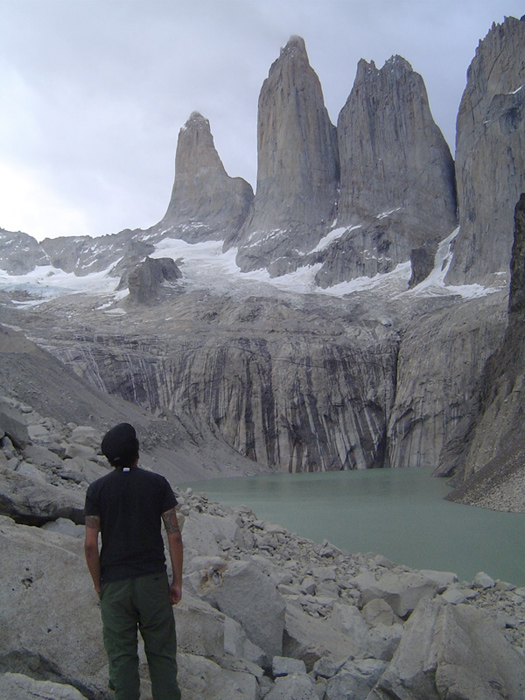
BME: So what’s a typical day like for you, if such a thing exists?
DO: I try not to have a routine, and my days change a lot depending on what I am thinking or reading or doing. Right now I’m back to the university, so first thing I do every morning after waking up and browsing the news online is head over to the university for my daily Russian lesson. Then I usually have some breakfast at the university, and head over to the library where I’ll either bump into some friends or read for a while. Either way, I try to read for at least an hour every day. The rest of my day depends on whether I have other classes/meetings/pending translations. I usually come back during the afternoon and cook myself something. I spend the afternoon either translating or reading or relaxing, although I try and go out for a movie at least once or twice a week. I usually write late at night.
Some months I also run, and some months, when I don’t go to school and have enough money, I travel. When I’m in the city, I see my friends a couple of times a week, although I spend most of my time by myself. If I have free time, I enjoy not doing anything. Since I don’t have a 9-5 job, things change every week for me. I like it that way. My life changes a lot, all the time.
BME: You’re back at university — what’s the status of your educational career? Where do you attend, for what, etc.?
DO: I’m currently studying my second Bachelor’s degree (Latin American Studies, at the National Autonomous University of Mexico; my main focus is on Latin-American Literature). I still have a bit to go, since I took some time off to travel and also to focus on other aspects of my work. I already completed the credits for my first Bachelor’s (Interpretation) and am currently starting to write my thesis.
I’m not sure I’m going to finish my second degree, though. I think it’s more likely that once I finish my thesis for my other degree, I’ll start a Master’s program instead. It’s not too difficult to get a scholarship for your Master’s degree, so it’s a better deal for me.
BME: What’s the topic of your thesis? And was that the program in which you were enrolled when you won the BME Scholarship?
DO: Well actually, the programs I was enrolled in back when I won the BME Scholarship are the same ones I am still finishing now. I hadn’t finished the credits for my degree in Interpretation, but I was already doing this one in Latin-American Studies.
My thesis is a bit strange. I just started it, but I’m excited about it. It’s a linguistic and social comparison of Latin-American literary Spanish in three different recent urban novels. The point is to somehow find similarities between Spanish dialects (specifically words in Peruvian, Mexican and Cuban Spanish) that can be traced not to a common etymological origin, but to social factors that lead to the invention of certain concepts. I’m particularly interested in words that can be traced to a Latin-American context (words that refer to symptoms of specific types of social inequality, for example).
BME: Can you talk about applying for the BME Scholarship? Was it helpful? Was the topic something to which you had given much thought prior to it being announced?
DO: Well, ever since I heard of the scholarship it seemed like the right thing for me. I waited for the 2006 edition to be announced and when it was, I began preparing my application. I thought about the question for a few weeks, took a few notes, and once I felt I was ready to write it, I started doing so. Essay is a genre I approach with more enthusiasm than precision, and this particular essay was probably the longest paper I had written in English by then, so it took me a bit to write, but once it was announced that I was the winner, I was thrilled about it, of course. The effort was well worth it.
But what’s really important for me about the BME Scholarship is that it helped me achieve objectives that would otherwise have been very hard to reach. The most tangible one is that I was able to pay off some of my academic expenses, and this allowed me to save money to go backpacking in South America, with the intention of writing a travel book. Which I did. The book, Más allá del sur (Beyond the south), is a collection of chronicles, stories and meditations, and it would have been impossible to write without the scholarship.
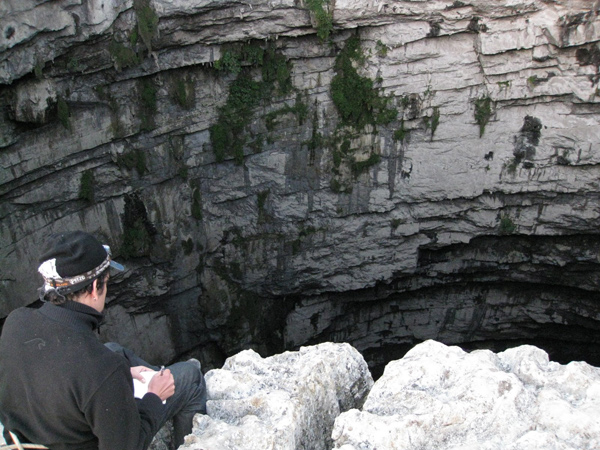
BME: Do you ever revisit the essay you wrote for the scholarship? How do you feel it holds up, a few years later?
DO: To say the truth, I don’t revisit it. I don’t like to read my own texts once they’ve been published. It’s a cruel thing to do to yourself. I’m sure some aspects of the essay would probably make me blush a bit now, but in general, I think the main ideas of the essay (freedom of the body and the moral consequences of some types of body modification) are issues I still hold very close to me and believe in, as well as being subjects which I still deal with in my writing.
However, I am a bit saddened by something I hadn’t noticed at the time I wrote the essay, but that seems more and more apparent to me: the existing tendency towards the trivialization of body modifications. Although there has always been a tension between whether it should be a cosmetic issue or a path of self-exploration, I feel that freedom of the body matters less and less to most people and has ceased to be a dominant force behind most people’s incursion into the world of body modification.
BME: I apologize if this qualifies as cruel, but in relation to your last point, in your essay, you wrote the following:
“Body modification and sexual practices which would easily have gotten people burnt by the inquisition 350 years ago, are now conceived as normal and desirable. I believe that this is due, partly, to the consolidation of a large sector of society that has worked hard at expanding the conception of what freedom is and also at better defining the acts that are acceptable under it. This, along with the growth of a necessity of identity and self-knowledge in a society characterized by its emptiness, has led to the the growth of an open-minded postmodern society that seeks authentic cultural experience that reassesses the value of individuals in hollow, massive and mostly anonymous urban societies that are still very repressive in many aspects. With more technology and freedom than ever, it has also led to a radicalization of the form of individualistic expressions that are allowed and that are practiced.”
Do you think the sort of trivialization to which you refer is perhaps an inevitable byproduct of this march towards widespread acceptance? Is this acceptance, in your opinion, worth the dilution and “superficial” nature of body modification you’ve observed lately?
DO: That’s a great question, but it doesn’t have an easy answer. I know this debate has been addressed on BME, and many opinions have been offered in regards to it, but personally, I think the answer lays in the core of not only body modification, but culture itself. I think body modification can be a form of art, and it responds to many of the same parameters as artwork, so maybe we can find answers if we reflect a bit on the main issues of the current aesthetic debate.
I’m familiar with literature, so I’ll place an analogy with literature. In the last thirty years, the amount of titles published throughout the world has been enormous. There have never been so many books being published. However, one of the main things bothering critics and other specialists is that the amount of good books being published has been scarce. What is considered a good book? Let’s just say that it’s a book that can say enough about language, life and art itself that it will withstand the passing of time. It has been very hard for scholars and critics to identify what the most important books of the last fifty years are, but it is widely agreed that the most relevant books of the twentieth century (titles by Proust, Joyce, Mann) were written early in its early years.
I don’t think the problem with this is that there are no good writers; there are several other reasons that can explain poor artistic production when compared to other periods of time. But one thing that has greatly affected literature is the fact that the market and the capitalist order have taken over much of literary production. This means that literature has become an object and if the market demands easy books, if people want to buy dumbed-down versions of books written two hundred years ago, publishing companies and writers comply. The purpose of a book is no longer to disturb or create intense feelings or say durable things, but to entertain. Books are no longer written because they need to be written, but because there is someone who wants to buy them, and authors care less about furthering an artistic tradition than they care about making money and selling books that say absolutely nothing new and will be irrelevant in five years.
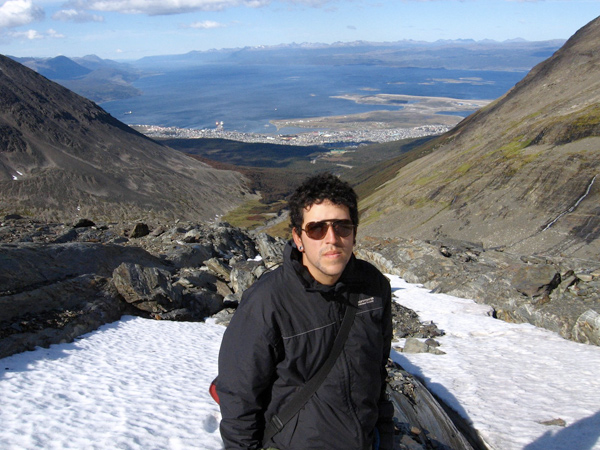
A similar thing is happening with body modification. The problem is not that it is becoming mainstream per se, but that it is becoming mainstream in a society of trivial intentions. It’s the same with other subversive aspects of culture, such as literature, drugs and sex. I think the fact that we have a healthy publishing industry is great; I think that the fact responsible drug use has gained acceptance makes us more free; I think that sexual liberation is one of the most wonderful cultural transformations of the last fifty years; and I am in favor of making body modification available to the world, to anyone who wishes to learn from it.
The problem with this approach is that since we live in a culture where pleasure-seeking and “having a good time” are our main values, we’re bound to turn these freedoms into means for easy thrills. For instance: most drug users no longer use psychedelic experimentation as a means to expand their consciousness. For most people who take ecstasy at a club on a Saturday night, it’s just way to have fun and forget about uncomfortable issues in their lives. Sex is no longer done with the subversive or liberating intention that can be found in the prose of the Marquis de Sade or in Georges Bataille’s A History of the Eye, in which characters question and destroy their moral values through intense pleasure. Nowadays, sex has become less erotic and more like standard pornographic fare, more of a spectacle and something frequently done out of social pressure than something truly fulfilling. People fuck to impress, not to enjoy, and therefore sex becomes little more than a slightly better way of reaching orgasm than masturbation.
It’s the same thing with publishing houses that use the prestige of books to make consumers think that reading dumb bestsellers is somehow a more refined way of spending time than watching TV. In a society that thinks this way, there’s no reason why a ritual that was once sacred for Native Americans, such as suspension, can’t just be a cool way of spending a Saturday afternoon, as good or bad but slightly more exciting than going to the movies to watch the latest Hollywood blockbuster.
There is no lack of talented tattoo artists in the world, but it surprises me that the amount of people taking risks when it comes to tattoos (and I don’t mean extreme eyeball tattooing; I mean simply getting tattoos that go beyond the icons of popular tattooing) is so low. One thing which really exemplifies this whole thing can be the growth of pun and joke tattoos. Tattoos that are meant to be funny and make reference to pop culture memes which will not matter in two weeks. I am not saying it is wrong to get a tattoo like this; it can actually be very subversive (a permanent expression of something impermanent). Actually, I’m not saying any of this is wrong, only that if these are the pervasive attitudes towards culture, we can’t expect much. I find it a bit odd that I can see thirty tattoos of puns, but no tattoos of poetry. Twenty portraits of pinup girls, but rarely do I find reproductions of fine art or art in general, however beautiful they may be. This indicates we live in a culture where the impermanent and the superficial have a much stronger appeal than the lasting.
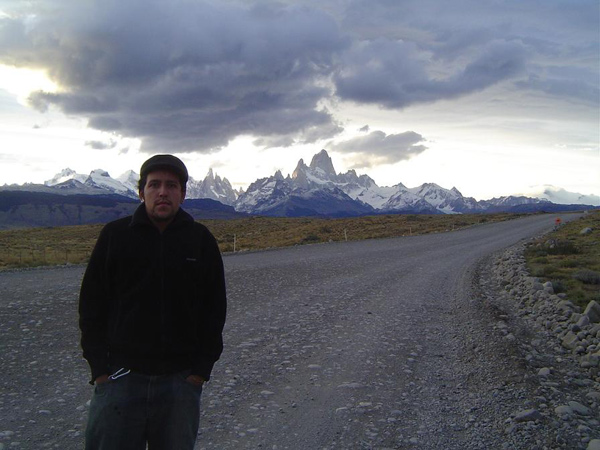
Here’s where current body modification and literary trends can draw a strong parallel, because most readers and most consumers of body art probably find searching or innovating too arduous. It’s probably too hard to learn about literary tradition or too boring to wait to think of a tattoo concept, and much easier to get a tattoo that you know people will like because there are already a million people with one like it and it looks good, or read a book that won’t challenge you too much.
And I’m not only referring to people getting standard butterfly tattoos, praying hands, or yin-yangs. This extends to the bigger pieces as well. People want a sleeve and they want it now, and if they’re ready to pay, they can get it. Whether it’s been done a million times and is full of clichés is irrelevant to them, and artists only have so much say in terms of what they will put on their customers. That’s one of the biggest paradoxes about popular tattooing: so many people get tattoos to be different, and end up looking all the same. Basically, what this shows is how easy it is for consumers to have both body art and literature on a short leash. Consumers become a tyrannical force and can turn culture into something devoid of meaning.
But does this mean we’re doomed? I hardly think this is the case, much less with body mods. There will always be the artists who create because they need to create and the artists which will develop a style and take it to the limit. There will always be people who get mods because they need to get mods, as there will always be those who write not because of the money, but because they’ll go nuts otherwise. That will never change.
The body is probably the ultimate canvas, one of the most powerful means of expression we currently have. Some artists know this. For example, when I see the work of Emilio González (to mention just one of many of the artists I admire), I see something incredible, something highly profound and poetic. He has transformed people’s bodies and made them look like nobody and no body has ever looked before. In this I see a whole new concept and a new poetic of what the body can be. It doesn’t even matter what the customer’s reasons were, he has been transformed into something else. But I’m not saying that everybody should go for the heavy surgical mods or that heavy mods are the only place where artistic criteria can apply. I think there is still tons of room left for innovation within tattooing, piercing and cutting.
But even though body modification has never seen so many adherents in the West, and this is surely a victory when it comes to social acceptance of mods, whether this social acceptance helps preserve and increase the profound and life-changing aspects (as I already noted, the fact that more books coming out hasn’t really improved the quality of literature) of body modification is something worth questioning.
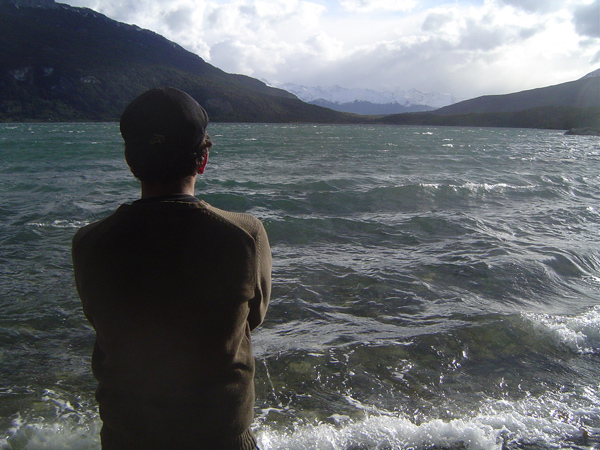
Read Diego online at 55° S. For more information about this year’s BME Scholarship, please visit BMEScholarship.com.
Please consider buying a membership to BME so we can continue bringing you articles like this one.
 BME/News and Modblog highlight only a small fraction of what
BME/News and Modblog highlight only a small fraction of what
It’s always good to read Diego’s writing. There’s always a fresh perspective and some new insight into the world.
It’s always good to read Diego’s writing. There’s always a fresh perspective and some new insight into the world.
Hey, I just wanted to thank everybody for reading this and Jordan at BME for taking his time to interview me. The interview was really fun to answer, and I hope it helps further some discussion on the issue of culture and body modification.
Diego
Hey, I just wanted to thank everybody for reading this and Jordan at BME for taking his time to interview me. The interview was really fun to answer, and I hope it helps further some discussion on the issue of culture and body modification.
Diego
Que buena entrevista Diego!
Thanks for sharing a piece of your mind with all of us!
Que buena entrevista Diego!
Thanks for sharing a piece of your mind with all of us!
Me gusta lo que escribes. También habitualmente leo tu blog.
Great Interview…
Me gusta lo que escribes. También habitualmente leo tu blog.
Great Interview…
Me encanta muchísimo lo que ha dicho usted sobre el tema de la tendencia en la sociedad hoy en día, preferir lo que es instantáneo y efímero a lo que endura, como si nuestros cuerpos fueran comida rapida! Me parece un síntoma de un problema más profundo en la sociedad moderna.
(Lo siento por mi espanol.)
Me encanta muchísimo lo que ha dicho usted sobre el tema de la tendencia en la sociedad hoy en día, preferir lo que es instantáneo y efímero a lo que endura, como si nuestros cuerpos fueran comida rapida! Me parece un síntoma de un problema más profundo en la sociedad moderna.
(Lo siento por mi espanol.)
Epale puntita,
Que lindo ver esas fotos tuyas del sur, cuando te conoci!
Estoy totalmente de acuerdo con lo que decis del D.F. – Mexican Curious, forever.
Epale puntita,
Que lindo ver esas fotos tuyas del sur, cuando te conoci!
Estoy totalmente de acuerdo con lo que decis del D.F. – Mexican Curious, forever.
Siempre es un placer leerte, es asombroso encontrar tanta sabiduría en alguien tan joven.
Siempre es un placer leerte, es asombroso encontrar tanta sabiduría en alguien tan joven.
Thanks for the nice comments, guys. Liliana, tu español no está nada mal, en verdad. Tienes razón en lo que dices: la vida moderna tiene una obsesión por lo rápido, por lo pasajero, y es paradójico que una cosa permanente como lo es el body-mod haya sido absorbido por una filosofía de esta naturaleza. ¿será que hemos perdido la capacidad como generación de pensar en el largo plazo? ¿o será simplemente que necesitamos placer constante y un consumo cada vez más radical para sentir que vale la pena vivir? Vale la pena ponderar al respecto.
Por cierto, ¿conoces a Gilles Lipovetsky? Creo que un análisis de la modificación corporal a partir de sus conceptos podría ser interesante.
Thanks for the nice comments, guys. Liliana, tu español no está nada mal, en verdad. Tienes razón en lo que dices: la vida moderna tiene una obsesión por lo rápido, por lo pasajero, y es paradójico que una cosa permanente como lo es el body-mod haya sido absorbido por una filosofía de esta naturaleza. ¿será que hemos perdido la capacidad como generación de pensar en el largo plazo? ¿o será simplemente que necesitamos placer constante y un consumo cada vez más radical para sentir que vale la pena vivir? Vale la pena ponderar al respecto.
Por cierto, ¿conoces a Gilles Lipovetsky? Creo que un análisis de la modificación corporal a partir de sus conceptos podría ser interesante.
not be a nay sayer, but that was way to verbose…. however, I’m grateful for a few things diego touched on that made me go, Hmmm
not be a nay sayer, but that was way to verbose…. however, I’m grateful for a few things diego touched on that made me go, Hmmm